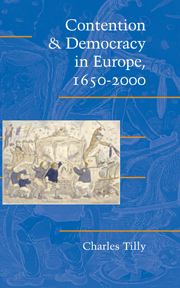8 - EUROPE AND ELSEWHERE
Published online by Cambridge University Press: 29 May 2010
Summary
Colonization, conquest, confrontation, and revolution all played their parts in European democratization outside Europe. In a vivid contradiction, 19th-century Europeans simultaneously promoted the spread of both democracy and tyranny outside their home continent. They promoted democracy among European colonists and their descendants, but they promoted tyranny over and among the peoples they colonized. We can distinguish four modes of colonial penetration: settler colonies, seizure of complex economies, coerced-labor systems, and exploitative but thin control (for a more complicated – but also more accurate – classification, see Abernethy 2000: 55–63).
In territories that were becoming settler colonies, European powers generally exterminated, enslaved, or ghettoized indigenous populations. Regions of extensive European settlement in the Americas, Africa, and Oceania all started with relatively authoritarian regimes; they typically began as plantations, properties of chartered companies, penal colonies, or regions under military administration. European settlers then established partly democratic regimes among themselves, but only slowly and reluctantly opened public politics to whatever remained of indigenous populations.
Seizure of complex economies went differently, and with much lower densities of European settlement. In Africa and (especially) Asia, Europeans sometimes sought to wring revenues and trade from differentiated agricultural and industrial establishments that remained largely under non-European control; British India provides the extreme case. In such circumstances, new composite political regimes generally emerged, borrowing some of their organization from the colonial power and remaining under the colonial power's influence, but bargaining out considerable autonomy even before independence.
- Type
- Chapter
- Information
- Contention and Democracy in Europe, 1650–2000 , pp. 243 - 260Publisher: Cambridge University PressPrint publication year: 2003



